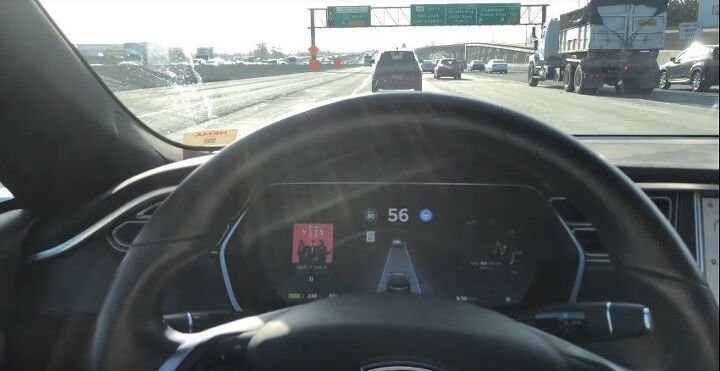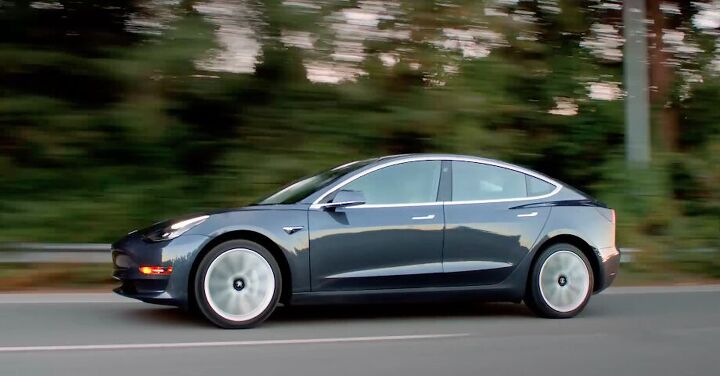#Safety
Fragile Valve Springs Leads to Global Toyota-Subaru Recall
The defunct Scion brand isn’t done making headlines, it seems. The rear-drive FR-S 2+2 sport coupe is among a number of vehicles — mainly Subarus — recalled over valve springs that could break, leading to serious engine damage.
In total, some 400,000 vehicles built between 2012 and 2013 are included in the recall; among them, Subaru BRZs, Foresters, and Imprezas. The Japanese-market Toyota 86 and North American-market Scion FR-S, twins of the BRZ, feature the same 2.0-liter four-cylinder.
Automakers Ready to Rock When New NHTSA Headlight Rules Arrive
The National Highway Traffic Safety Administration announced earlier this month that it was willing to considering changing the rules that govern automobile headlights. Now in a comment period before its official review, the proposal would permit automakers to install and enable adaptive driving beam headlights on new cars sold in the United States. While some automakers are preparing themselves for the change, most have been ready for ages.
One one hand, this proposed change should help lousy drivers from burning out your retinas on a lonesome country road. But, by the same token, you may no longer have the delicious opportunity to blast them with the brights once they’re within a few feet of your car to let them know to lower those damned high beams.
Just kidding, that would be illegal. Federal mandates require all drivers to dim their headlights when approaching within 500 feet of an oncoming vehicle or when approaching a vehicle less than 300 feet ahead. Of course, nobody we know has ever witnessed this law being actively enforced — even though it’s probably as dangerous as moderate speeding infractions. Regardless, it’ll gradually become a non-issue if the rules change.
Global Survey Reveals Who We'd Prefer to Sacrifice on the Bumper of a Self-driving Car
In 2014, as publications and automakers began making greater noise about autonomous vehicles, researchers at MIT’s Media Lab issued some questions to the public. The institute’s Moral Machines experiment offered up a series of scenarios in which a self-driving car that has lost its brakes has to hit one of two targets, then asked the respondents which of the two targets they’d prefer to see the car hit.
Four years later, the results are in. If our future vehicles are to drive themselves, they’ll need to have moral choices programmed into their AI-controlled accident avoidance systems. And now we know exactly who the public would like to see fall under the wheels of these cars.
However, there’s a problem: agreement on who to sacrifice differs greatly from country to country.
Gas Up That Focus, Ford Says, As Automaker Launches Recall of 1.5 Million Cars
While Ford unceremoniously ended Focus production in the U.S. earlier this year, the model is trying its best to stay in the public eye. The automaker has announced a recall of nearly 1.5 million Focus vehicles in North America to prevent a stuck purge valve from vacuuming up the 2.0-liter engine’s performance.
As owners await notification, Ford implores them to head to their local gas station and fill’er up.
ZF's New Camera System Focuses on an Oft-ignored Danger: the Driver
The rollout of semi-autonomous driver assist systems designed to turn long highway slogs into stress-free, breezy jaunts isn’t in any way perfected, but OEMs and suppliers are working on it. Depending on who builds what, lane-holding can be dodgy, automatic braking can be capricious, forward-facing cameras and radar can misidentify or ignore objects, and drivers can easily be put on too long a leash, encouraging misuse.
It’s the latter issue that automotive supplier ZF wants to solve with its new interior camera system.
NHTSA Probes Ford Power Tailgates That Lower Themselves
In early August, Fiat Chrysler Automobiles recalled 1.1 million Ram pickups after owners reported losing their loads, the fault of a tailgate that wouldn’t stay latched. Ford now seems to have a similar problem, only in this instance the tailgates carefully lower themselves under electric power.
A ghost in the machine? More like an electrical issue that the National Highway Traffic Safety Administration wants to get to the bottom of. This week, the safety agency announced the launch of an investigation into consumer complaints related to the wonky gates, possibly heralding a recall of 2017 F-Series trucks.
Higher Risk: Study Claims States That Legalized Marijuana Have More Traffic Accidents
The Insurance Institute for Highway Safety and the Highway Loss Data Institute announced Thursday that auto crashes in states with legalized recreational marijuana have increased 6 percent. Both groups will be on hand at the Combating Alcohol-and Drug-Impaired Driving summit at IIHS’ Vehicle Research Center in Ruckersville, Virginia to present two studies on the issue. Perfect timing, considering Canada just became the second country to legalize the substance and support for decriminalization continues to grow in the United States.
Of course, things are rarely so simple. While the IIHS and HLDI remain confident in their research, the National Highway Traffic Safety Administration claimed marijuana use was unlikely to contribute to traffic mishaps in any meaningful way back in 2015. And that’s just for starters. There is so much conflicting information on this issue, it’ll make your head spin harder than the most savage bong rip of your life, bro.
The Message Isn't Getting Across - Drivers Still Think Too Highly of Gee-whiz Driver Assist Features
American safety advocates have long cautioned motorists and manufacturers that poor communication leads to unrealistic expectations of driver assist systems, thus putting lives in danger. The Europeans are waking up to this reality, too.
Despite an ever-growing list of standard tech in new cars, customer bewilderment hasn’t waned, a new study shows. You’d be alarmed (but perhaps not surprised) by the number of people who think self-driving cars are already on the market.
Musk Claims Tesla's New Autopilot Chip Is Only Six Months Away
Tesla CEO Elon Musk says a new chip aimed at improving its vehicles’ Autopilot features will be available in about six months.
However, if you’re hoping the automaker is preparing to light some candles and knock its vehicles up with legitimate self-driving technology, you’ll need to keep on wishing. During a string of tweets on Tuesday, Musk explained that the new chip would be a $5,000 extra for customers who did not purchase their cars with the “Full Self-Driving” package — an automotive claim that’s about as valid as Donald Trump’s hair or Elizabeth Warren’s status as a Native American.
Freeway Spinouts and Injuries: Report on Uber-Google Lawsuit Shines Light on Self-driving Tech's Dangerous Early Days
If reading about young brainiacs with God complexes and too much money living in Silicon Valley makes you ill, best not read this while eating. For everyone else, you’re encouraged to take a peek at this report in The New Yorker.
It’s a Marianas Trench-deep dive into what occured in the years leading up to last year’s filing of an intellectual property theft lawsuit by Google’s Waymo autonomous vehicle unit against ride-hailing company (and rival self-driving vehicle developer) Uber. The alleged theft is intriguing, but the behind-the-scenes accounts of what went on at Google’s pre-Waymo self-driving car effort is the stuff of HBO and Netflix. There’s crashes and mayhem, egos, genius, and money, money, money.
Absolutely no sex, of course.
Brighter, More Effective Headlights Now a Step Closer
The National Highway Traffic Safety Administration might soon grant automakers a long sought-after wish. On Thursday, the agency put forward a proposal to allow adaptive driving beam headlamps on U.S. passenger vehicles.
ADB lights would solve two problems at once: insufficient roadway illumination, as well as headlight glare. Despite the existence of automatic high beams, automakers currently have to find a happy medium in the amount of low-beam light thrown ahead of the car to prevent blinding oncoming motorists. According to the Insurance Institute for Highway Safety, which recently added headlight performance to its ratings criteria, plenty of new cars fail to find the right balance.
Following a Week of Toyota Recalls, the C-HR Gets Its Turn
It’s only 700 vehicles from the 2019 model year, but the voluntary recall issued by Toyota today involves the possibility of the rear wheels falling off. That seems a little more concerning than having your Prius go into limp mode.
The issue with the C-HR lies in its rear axle hub bearing bolts, one or more of which may not have received a proper tightening at the factory. Should they come loose while on the road, the C-HR could end up a three-wheeler.
Hot Stuff: Ford GT Recalled for Fire Risk
It wouldn’t be a supercar without some risk of getting burnt. Those performance limits are far beyond the capabilities of most owners, after all.
This time, however, the threat of conflagration is real.
According to Ford, certain copies of the GT run the risk of dribbling hydraulic fluid from the lines feeding its adjustable rear spoiler. Since the car’s centrally-mounted exhaust tips are located in close proximity, this problem could set the whole works ablaze.
Deja Vu: Tesla Gets Into It With the NHTSA - Once Again - After Crash Test Boast
Following the release of crash test results in 2013, Tesla claimed the Model S earned more than five stars on the National Highway Traffic Safety Administration’s ranking scale. Nuh uh, said the NHTSA. There’s only five stars to hand out. No one gets more than that.
Fast-forward five years and the exact same thing is occurring, this time centered around the just-tested Model 3. That sedan, which still isn’t cheap, earned five stars in all NHTSA crash categories. Kudos to Tesla engineers. However, the NHTSA isn’t happy with Tesla’s weekend boast that suggested the Model 3 is the safest car ever tested by the federal agency.
NTSB Looking Into Limo Regulations in Wake of Deadly Crash
The deadliest U.S. transportation accident in the last decade occurred in upstate New York this weekend, but it didn’t involve a airliner, train, or bus. The vehicle in question was a modified 2001 Ford Excursion. All 18 occupants of the aging limo died after the vehicle failed to stop at an intersection, with two pedestrians struck and killed in the parking lot where the runaway vehicle ultimately came to rest.
In the vehicle was a group of young people, including many couples and relatives, who were headed to a birthday celebration. While limo operators are already subjected to federal oversight, the National Transportation Safety Board plans to probe existing regulations as part of its investigation.





























Recent Comments